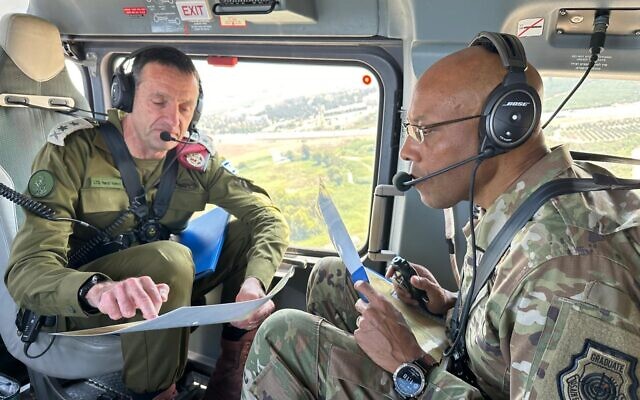Chairman of the Joint Chiefs of Staff Gen. Charles Q. Brown, the highest-ranking US military officer, visited northern Israel on Monday, a day after Israel and Hezbollah exchanged their heaviest round of fire since October 7.
Brown’s visit demonstrates strong US support for Israel in its fight against Hezbollah. The US provided Israel with intelligence for its strikes in southern Lebanon on Sunday and helped track Hezbollah missiles and drones that were fired into northern and central Israel.
Brown made the visit to the Israeli military’s Northern Command headquarters with Israeli Defense Forces (IDF) Chief of Staff Lt. Gen. Herzi Halevi. According to The Times of Israel, the IDF said the two military leaders were “presented with the ongoing combat against Hezbollah during the war and the operational plans for the future.”
They also “discussed security and strategic issues regarding the expansion of operational tools and the strengthening of regional partnerships as part of the response to threats in the Middle East.”

The US has deployed additional warships and fighter jets to the Middle East as a threat to Hezbollah and Iran and has pledged to defend Israel. The White House said on Monday that the US will continue to maintain the presence of two aircraft carriers in the region as it is still expecting Iran to launch an attack on Israel as retaliation for the Israeli assassination of Hamas’s political chief in Iran.
According to Israel’s Channel 12, in some of Brown’s discussions with Israeli officials, the Israelis pushed for the US to establish a “credible military threat” against Iran or potentially launch strikes on Iranian nuclear facilities to prevent Tehran from acquiring a bomb. Despite claims from Israel, there’s no indication Iran is seeking a nuclear weapon, something that’s been acknowledged by US intelligence in this year’s “threat assessment.”
Israeli Defense Minister Yoav Gallant also met with Brown and hinted at potential military action against Iran’s civilian nuclear program. “We are at a point where we must always be ready to fulfill the shared commitment of Israel and the US to prevent Iran from obtaining a military nuclear weapon,” he said.


